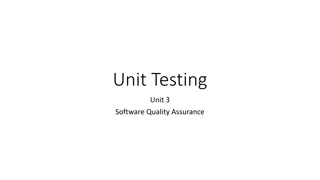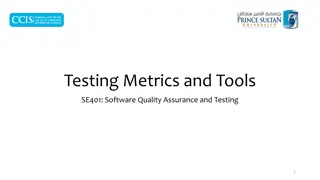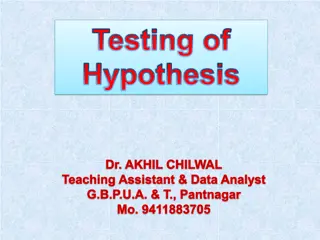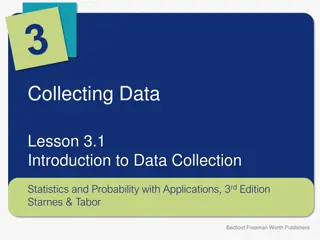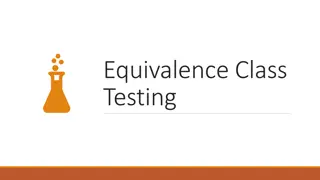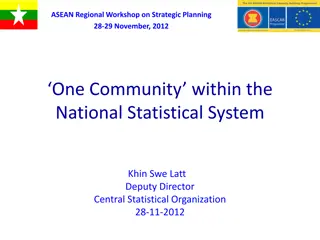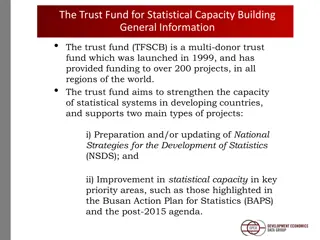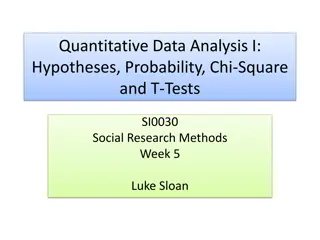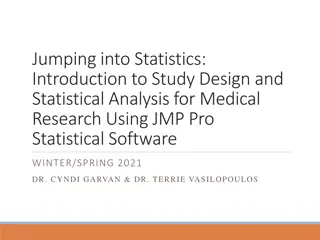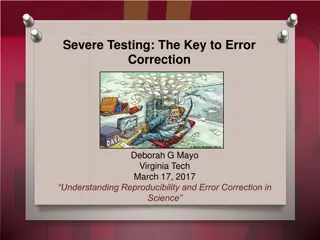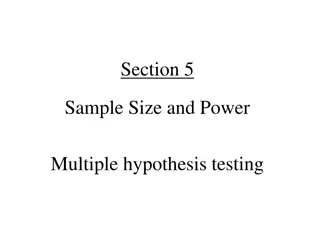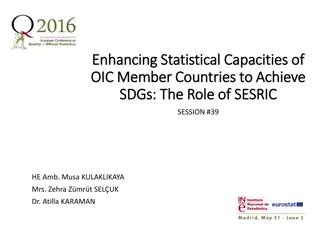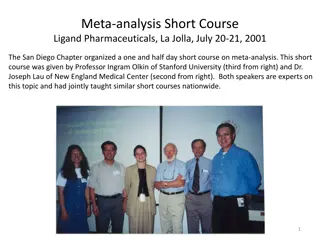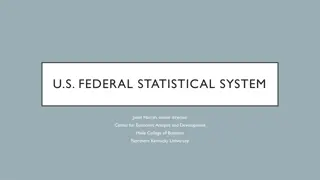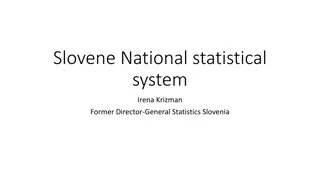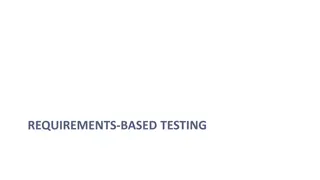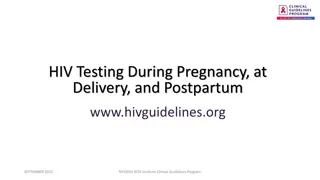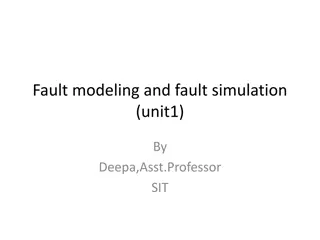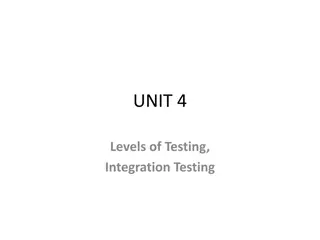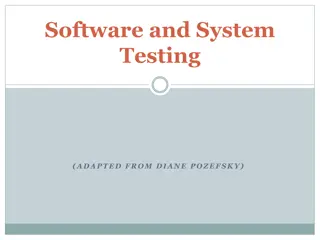Eliminate Bugs, Unleash Growth Revsyntech's Software Testing.
Unit Testing\nIntegration Testing\nSystem Testing\nAcceptance Testing\nEliminate Bugs and unleash Growth of Revsyntech's Software Testing.
2 views • 1 slides
Software Quality Assurance: Understanding Unit Testing and Boundary Value Testing
Unit testing is a crucial method in software development to ensure each part of the program behaves as intended. It helps detect problems early and provides a written contract for code quality. Additionally, Boundary Value Testing is a black box technique that focuses on input domain testing, with a
1 views • 49 slides
Fundamentals of Software Testing: Quiz on Testing Principles
This quiz focuses on fundamental concepts in software testing, covering topics such as test conditions, testing objectives, differences between testing and debugging, and common failure scenarios. Questions are structured to assess understanding of key principles and objectives in software testing.
2 views • 26 slides
Understanding Software Testing Metrics and Tools
Software testing metrics play a crucial role in evaluating the quality and progress of the testing process. Metrics provide valuable insights into the readiness, quality, and completeness of a product. By measuring attributes such as defects, testing efficiency, and productivity, organizations can m
3 views • 100 slides
Understanding Hypothesis Testing in Statistical Analysis
Statistical analysis aims to make inferences about populations based on sample data. Hypothesis testing is a crucial aspect where decisions are made regarding accepting or rejecting specific values or parameters. Statistical and parametric hypotheses, null hypotheses, and decision problems are key c
1 views • 34 slides
Fundamentals of Software Testing Explained
Software testing is a critical process to ensure that software applications meet requirements and are free of defects. It involves various activities such as test planning, analysis, design, implementation, and execution. Testing approaches like the Bing bang approach and Total Quality Management ar
1 views • 48 slides
Understanding Variation in Statistical Studies
Variability is key in statistical studies, shaping the essence of statistical analysis. Students often struggle to grasp the concept of variability, despite being taught statistical methods. The term "variation" takes on different meanings in various statistical contexts, presenting challenges in co
1 views • 54 slides
Introduction to Data Collection & Statistics: Understanding Statistical Questions, Population, and Sampling
This material introduces the fundamental concepts of data collection and statistics. Learning objectives include distinguishing statistical questions, identifying populations and samples, and understanding the difference between observational studies and experiments. It discusses the process of stat
0 views • 14 slides
Understanding Equivalence Class Testing and Its Application in Software Testing
Equivalence class testing is a software testing technique that involves dividing input values into classes for effective testing coverage. Equivalence classes are defined mathematically as subsets of a given set, ensuring partitioning and mutual exclusivity. By applying equivalence partitioning, tes
1 views • 21 slides
Uganda's Successes in Reaching Men with HIV Testing Through Assisted Partner Notification Program
Uganda has successfully implemented an Assisted Partner Notification (APN) program to reach men for HIV testing, addressing the gender gap in testing rates. By utilizing various approaches such as index testing, self-testing, and social network testing, Uganda has achieved significant success in tar
0 views • 12 slides
Exploring the Power of Wise Queries in Statistical Learning
Dive into the world of statistical learning with a focus on the impact of wise queries. Discover how statistical problems are approached, the significance of statistical queries, and the comparisons between wise and unary queries. Explore the implications for PAC learning and uncover key insights in
0 views • 8 slides
Software Testing Foundation Level: Testing Throughout the SDLC Quiz
Explore key concepts in software testing throughout the Software Development Lifecycle (SDLC) with a quiz covering topics like white-box testing in acceptance testing, component testing vs. system testing, and regression testing purposes. Enhance your understanding of testing methodologies with samp
5 views • 17 slides
Understanding IBM SPSS for Statistical Analysis
IBM SPSS, formerly known as Statistical Package for the Social Sciences, is a powerful software package for statistical analysis used by researchers across various industries. Developed in the late 1960s, SPSS offers features for data management, statistical analysis, and data documentation. It simp
1 views • 13 slides
Overview of Myanmar Statistical System and Central Statistical Organization
The Myanmar Statistical System operates as a decentralized system with the Central Statistical Organization playing a crucial role at the national level. Various surveys and data collection efforts are undertaken by different ministries and agencies, coordinated by the CSO. The CSO compiles and pres
0 views • 18 slides
Importance of Software Testing in Preventing Catastrophic Failures
Software testing is crucial in ensuring the reliability and safety of software systems, as highlighted by catastrophic failures such as the Ariane 5 rocket incident and the Therac-25 radiation therapy machine disasters. These examples underscore the importance of thorough testing in identifying and
1 views • 42 slides
The Trust Fund for Statistical Capacity Building
The Trust Fund for Statistical Capacity Building (TFSCB) is a multi-donor trust fund launched in 1999, supporting over 200 projects worldwide to strengthen statistical systems in developing countries. It focuses on national strategy development and improving statistical capacity in key priority area
1 views • 5 slides
Understanding Hypotheses, Probability, and Statistical Tests in Social Research
This content delves into formulating hypotheses in social science, selecting statistical tests based on variables' measurement levels, understanding probability in statistical analysis, and distinguishing between null and alternative hypotheses. It emphasizes the research process involving hypothesi
5 views • 21 slides
Testing Approach in SCREAM for E3SM Fall All-Hands 2019
Major effort is focused on verification and testing in SCREAM for the E3SM Fall All-Hands. The initiative includes unit testing, property testing, regression testing, and leveraging various tools like Cmake, Python, Jenkins, AutoTester, and GitHub for Continuous Integration (CI). The emphasis is on
1 views • 21 slides
Difference Between Manual Testing and Model Checking
Manual testing focuses on testing specific scenarios with concrete inputs and outputs, while model checking involves imagining all possible scenarios to create a general environment for testing. In manual testing, users test specific execution scenarios, whereas in model checking, users envision and
2 views • 4 slides
Understanding Hypothesis Testing in Statistics
Explore the concept of hypothesis testing through an engaging scenario involving Edison light bulbs. Learn about factors influencing hypothesis testing such as variability, sample size, and sample mean. Discover the logic behind hypothesis testing using Jake's napkin dispensers example. Enhance your
0 views • 28 slides
Jumping into Statistics: Study Design & Statistical Analysis in Medical Research
Explore the fundamentals of study design & research methodology, learn to select appropriate statistical tests, and practice statistical analysis using JMP Pro Software. Topics include research question formulation, statistical methods, regression, survival analysis, data visualization, and more. Un
0 views • 31 slides
Understanding Error Correction and Reproducibility in Science
Explore the importance of severe testing, statistical crisis of replication, and the American Statistical Association's stance on P-values in ensuring reproducibility and error correction in scientific research. Delve into the philosophical, statistical, and historical aspects of error statistical m
0 views • 63 slides
Understanding Sample Size, Power, and Hypothesis Testing in Statistics
Sample size determination based on estimation precision and confidence interval width is crucial in statistical analysis. By calculating the necessary sample size, researchers can ensure sufficient standard errors and confidence intervals. Additionally, the relationship between power and sample size
0 views • 50 slides
Enhancing Statistical Capacities of OIC Member Countries to Achieve SDGs: The Role of SESRIC
This presentation discusses the importance of enhancing statistical capacities in OIC member countries to achieve Sustainable Development Goals (SDGs), with a focus on the role of SESRIC. It covers the evolution of statistical definitions, the use of Statistical Capacity Index (SCI) for analysis, an
2 views • 17 slides
Enhancing Global Statistical Systems for Sustainable Development
The post-2015 development agenda emphasizes the need for a comprehensive global policy agenda, impacting statistical systems worldwide. This agenda seeks to improve data collection, coordinate international statistical efforts, and enhance national statistical systems by 2020 to support the Sustaina
0 views • 23 slides
Understanding Hypothesis Testing in Statistics
Hypothesis testing is a fundamental concept in statistics that involves testing statements about population parameters. This content covers the basics of hypothesis testing, including types of hypotheses, examples, and the procedure involved in statistical hypothesis testing. It also explores the im
0 views • 23 slides
Role of Statistical Standards in Building National Data Backbones
The role of statistical standards in constructing national data backbones is crucial for efficient data dissemination and reporting, especially in the context of Sustainable Development Goals (SDGs). Statistical standards guide the orchestration of information flows within a national statistical net
0 views • 22 slides
Statistical Events in San Diego Area (2001-2003)
Several significant statistical events took place in the San Diego area between 2001 and 2003, featuring renowned speakers and experts in the field. These events covered topics such as meta-analysis, global atmospheric changes, statistical trends, and annual statistical career days. The gatherings p
0 views • 12 slides
Overview of the U.S. Federal Statistical System and Census Geography
The U.S. Federal Statistical System comprises 13 principal statistical agencies responsible for collecting and analyzing data across various sectors. The system includes agencies like the Bureau of Economic Analysis, Bureau of Labor Statistics, and U.S. Census Bureau. Geographic identifiers (GEOIDs
0 views • 94 slides
Statistical Inference and Testing in HUDM4122
The course announcement includes changes in homework deadlines, discussion of confidence intervals and statistical significance testing, along with examples on how to calculate lower and upper bounds for confidence intervals, and determining the percentage of games a sports team will win. The conten
0 views • 75 slides
Understanding Testing in Software Engineering
In the previous session, we discussed various aspects of software engineering, including modeling with UML diagrams, such as activity diagrams, use case diagrams, sequence diagrams, state diagrams, and class diagrams, as well as architecture patterns. Testing was emphasized as a key aspect, highligh
0 views • 35 slides
Understanding Gray Box Testing in Software Development
Gray Box Testing is a software testing technique that involves testing the software with partial knowledge of its internal workings. It combines aspects of White Box Testing and Black Box Testing, allowing testers to check both the presentation layer and the code part of an application. Gray Box Tes
0 views • 14 slides
Slovene National Statistical System Overview
The Slovene National Statistical System comprises institutions like the Statistical Office of the Republic of Slovenia and various advisory committees responsible for producing official statistical data following European and UN standards. It emphasizes neutrality, objectivity, transparency, and con
0 views • 9 slides
Understanding Requirements-Based Testing in Software Development
Dive into the world of requirements-based testing in software development, exploring main concepts, test levels, testing roles, and the importance of testing your solution and modeling case. Learn about test cases, different testing activities, and the significance of acceptance testing in identifyi
0 views • 16 slides
Guidelines for HIV Testing During Pregnancy and Postpartum
These guidelines recommend HIV testing during pregnancy, at delivery, and postpartum. Testing should be done early in pregnancy and again in the third trimester. Expedited testing during labor is required for certain patients, and syphilis testing is recommended. Pre-exposure and post-exposure proph
0 views • 18 slides
Comprehensive Overview of Fault Modeling and Fault Simulation in VLSI
Explore the intricacies of fault modeling and fault simulation in VLSI design, covering topics such as testing philosophy, role of testing in VLSI, technology trends affecting testing, fault types, fault equivalence, dominance, collapsing, and simulation methods. Understand the importance of testing
0 views • 59 slides
Understanding Unit Testing in Software Engineering
Concept Software is a discipline comprising various code pieces. Testing these codes together is complex but vital in Software Engineering. The process includes early testing like unit tests, pairwise/multiple component testing, module testing, integration testing, user tests, alpha tests, beta test
1 views • 6 slides
Understanding Integration Testing and Levels of Testing
Explore the importance of integration testing in software development, covering topics such as traditional testing levels, the SATM system, goals and purposes of integration testing, testing level assumptions and objectives, software process overview, various approaches to integration testing, and t
0 views • 39 slides
Importance of Software and System Testing
Understanding the critical role of software and system testing in identifying and fixing errors before they lead to major failures. Various types of testing such as functional, usability, performance, and reliability testing are essential to ensure the quality of software products. Different classif
0 views • 52 slides
Statistical Tools for Method Validation in USP General Chapter 1210
In the USP General Chapter 1210, Statistical Tools for Method Validation are outlined, serving as a companion to the validation of Compendial Procedures. The chapter covers important topics like Accuracy, Precision, Linearity, LOD, LOQ, and range. It emphasizes statistical tools such as TOST, statis
0 views • 22 slides

